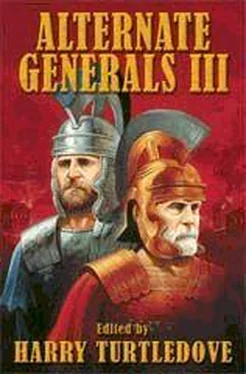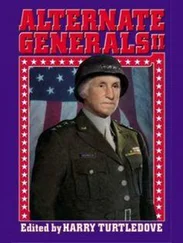Light danced and glittered in the glazy eye of the severed elephant head at the foot of the Carthaginian general's bed.
Hannibal screamed.
East of Appomattox
Lee Allred
Even a marble man has his limits. Perhaps they might not think so back home, but London was not Richmond. London was too damp and chill and Robert E. Lee too old to pretend otherwise.
He cleared his throat and called to the young office clerk on the other side of the wooden railing. "Young man," he asked, "might I have some hot tea while I wait?"
The clerk's only response was to duck his head and hunch himself over his paperwork.
Lee had expected as much.
The small wall clock struck the quarter hour. Big Ben, on nearby Westminster's clock tower, echoed a muffled reply through the thick walls of the squat Foreign Office building. For several minutes the only other sound in the room was the scratching of the clerk's pen nib. It was a small office, just big enough for the bench Lee sat on, the clerk's desk, and the wooden railing separating the two. A swinging gate in the railing allowed the clerk passage into the hallway, a side door near his desk to what Lee assumed was the office of whatever official the clerk served. From the looks of the rusted hinges, the door saw little use.
The clerk set down his pen and blew on his hands to warm them. Lee allowed himself a slight smile. This cramped, drafty excuse for an office was just as cold for a Londoner as it was for a son of gentle Virginia. Lee's smile vanished as a new current of cold air blew down the back of his neck. He drew the collar of his military cloak tighter.
A military cloak , thought Lee. He shook his head.
Ambassadors do not wear military uniforms. At least, not ambassadors from America-either of them-but Longstreet had insisted Lee do so. General Lee, after all, was still well thought of in London even five years after the war. The President had hoped Ambassador Lee would be just was well regarded.
Well, that only proved Longstreet was no more infallible than Lee was, regardless what any of the new history books said about Gettysburg. Lee and his uniform had fared no better in London than his predecessors. The British had shuffled Lee from one government office to another until he had at last been led to this forgotten hallway where now they studiously avoided recognizing his existence, let alone that of his nation.
He had sat here unattended to for hours. Now it was nearly the end of the working day. He wondered if they would simply shut up the building for the night with him still sitting on this hard, cold, splintery bench.
Enough.
He took hold of his cane with his good arm and heaved himself up off the bench. He stepped over to the wooden rail and, leaning over, tapped the cane on the desk of the startled clerk.
"Young man, I do not fault you for doing what you clearly have been ordered to do. Your obedience is commendable in one so young. But as I am a guest-however an unwanted one-in your establishment, propriety, sir, common decency requires that you as host see to it that an old man with a bad heart does not die on the premises. Surely Her Majesty's government has at least the manners of a third-rate hotel. In short, sir, I am freezing to death!"
The rusty latch of the side door clacked open.
The boy's head slowly turned in its direction. Lee, however, pretended not to notice. He rapped his cane again. "I repeat myself, young man, in case my Virginian tongue falls hard upon your English ears. Might," he said slowly, pausing on each word, "I have some hot tea while I wait?"
The side door opened an inch or two at this, just enough to show Lee a glimpse of a portly red-haired gentleman. The man humphed in a deep voice and said gruffly, "Smedley, fetch some tea."
"B-but-sir! You said-!"
"Fetch some tea, Smedley. The British Empire isn't about to fall merely because you bring an old man some tea. See to it, boy!" A pause. " And see you do nothing more ."
Smedley gulped and nodded. He scurried through the gate in the railing, past Lee, and down the hall out of sight.
Lee turned to speak to the man, but the door quickly shut and the door latch clacked into place. Lee returned to his bench.
Smedley returned shortly. He carried a wooden tray with a battered tea service. He placed the tray on Lee's bench without a word and fled back to his desk.
Lee shrugged and poured himself some tea. He squeezed a slice of lemon into his cup. The juicy spray carried in the room's draft, filling the cramped office with the smell of lemon.
Lemons.
Lee thought yet again of poor Jackson and as he did so Lee's arm twinged. The dull pain in his arm had started that horrible night at Chancellorsville. The pain sometimes turned his arm numb, leaving it hanging there useless. Doctors told him it was caused by a failing heart, but late at night Lee wondered. What did doctors know of the workings of Providence? Of restitution and of vengeance? Had Lee not uttered the words himself? You have lost your left arm, but I have lost my right…
Lee shook his head to clear it of the memory. Steam curled lazily up from his tea. He drank. The tea's warmth quickly spread through his tired frame. Once the cup was drained, he pushed the tray aside and began his wait again.
Lee's last campaign: his siege of London. The siege of Baltimore had gone easier, but an army fought beside him then. Now he had only himself.
Only himself and a God who had turned His back on Lee. A God who now spoke to him only through the dead words of one who would never speak again.
Strange, Lee could never remember any of the glorious speeches of Southern politicians, but Lincoln's words? Lincoln's words, even those from discarded texts never uttered, texts now unread, unwanted-those words were chiseled upon Lee's heart.
Whether that nation-or any nation, so conceived and so dedicated-can long endure.
The North had lost Mr. Lincoln's War. But had the South truly won Mr. Davis's? Had it done so, would Lee be in London today? The prayer of both could not be answered; that of neither has been answered fully. The Almighty has his own purposes .
He turned his face away from the young clerk and wept the tears of an old man.
The clock chimed the end of day in the City. Neither Smedley nor Lee moved from their respective post. He could hear the bustle of the rest of the Foreign Office locking up for the night. No one came back to check on him. Soon the entire building was quiet, save for the ticking of the clock.
I imagine it is dark outside already, Lee thought. The sun sets early in mid-October this far north. London was farther north, even, than the tip of Maine.
Virginia , Lee forcefully corrected himself. Old habits died hard. The proper frame of reference was the northern tip of his nation. Maine had no more meaning for him now than had Nova Scotia or Newfoundland.
Yes, and keep telling yourself that, old man. Perhaps you-and the British-will one day believe it.
A new hour chimed. Smedley set down his pen and began to clear things away for the night. He trimmed the gaslights one by one. Before extinguishing the last one, he paused, then called out without looking back at Lee, "If there is anyone left in the building-and I'm not saying there is, mind you! — but if there is they might be wanting to leave before I trim all the lights. This old building's a right rabbit's warren with the lights out, all right."
Lee grunted as he pulled himself up by his cane. "Speaking to men who don't exist, are we, young Smedley? A slippery slope, indeed. You might soon fail to remember that nonexistence of the person whom, of course, you aren't addressing."
Читать дальше












